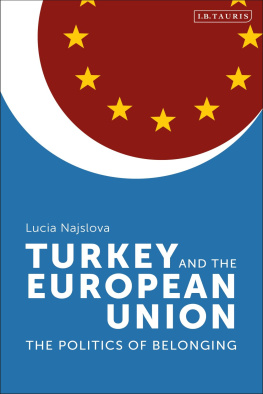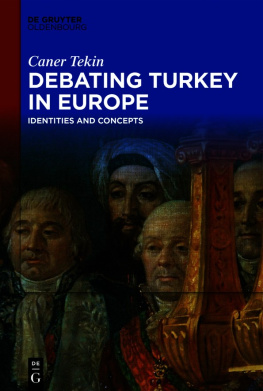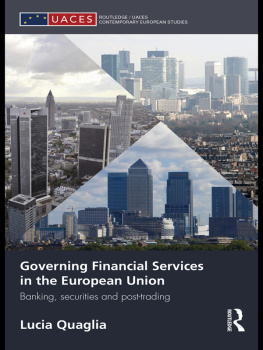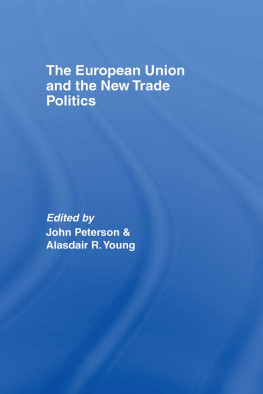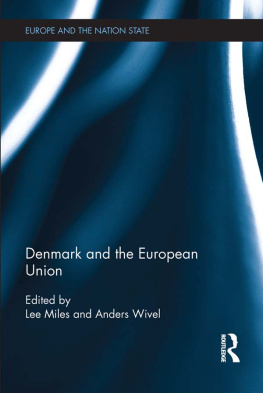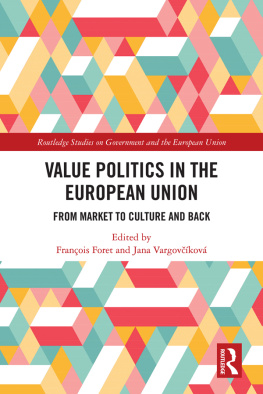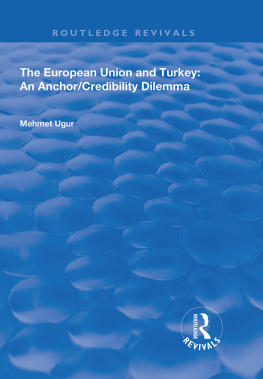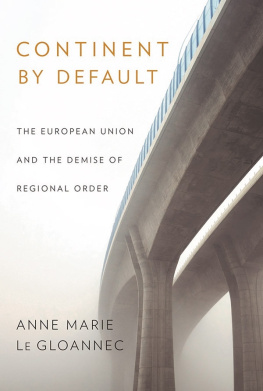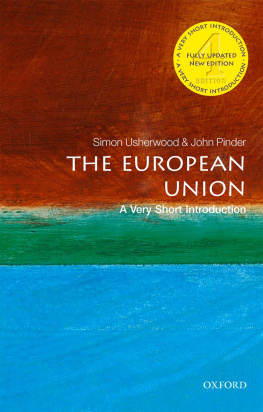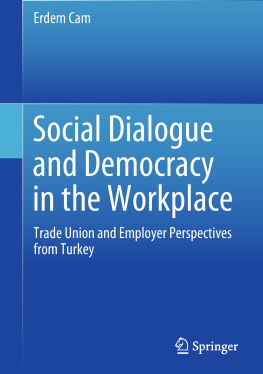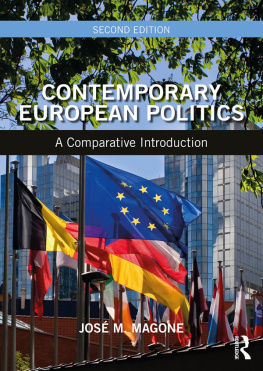To my mother, who taught me to love the Mediterranean.
To Tarik and Zuzana. To the many people working and living
somewhere in EU-Turkey relations, who have felt misunderstood,
but have not given up looking for common language.
I wrote this book because I believe that exclusion is wrong. I wrote it also because I believe that humans and the institutions they (we) built often exclude others without knowing how it feels to be locked out. This book has been drafted, redrafted, put on hold, forgotten, and rediscovered. It has had, like any book, many versions and eventually came to life mainly thanks to colleagues, friends, and strangers, who kept reminding me that the story is worth telling. Responsibility for the final shape including the flaws is mine, of course, but the sections, chapters, paragraphs, sentencesnone of this could have appeared without a long list of others. I am grateful for precious mentorship, encouragement, and also acceptance that things would still be alright if this does not get written. The early ideas feeding this manuscript came around the middle of the first decade of the twenty-first century, when some in the EU were celebrating its big bang enlargement and others were mourning it. This was the time when post-socialist states were let in, and things started to look optimistic for Turkey, too. Since that time, I have had the opportunity to spend over a decade traveling across various places on the European map, and to assemble fragments of (partially) enlarged EU-rope, all of which have eventually pointed toward the theme of belonging , a word I consider defining for Europe at the time of writing.
The list of individuals and institutions that supported this work is long. The Faculty of Social Sciences at the Charles University in Prague, the Faculty of Social and Economic Sciences at the Comenius University in Bratislava, the Research Center of the Slovak Foreign Policy Association in Bratislava, the Institute for European Politics EUROPEUM and Institute of International Relations in Prague have been generous with travel and research grants and collegial support. I have greatly benefited from visiting fellowships at the University of Oslo and the Ko University in Istanbul and I am grateful to Yunus Emre Vakf for covering part of my early Turkish language education. Earlier versions of parts of this manuscript have been presented to audiences at the University of North Carolina at Chapel Hill in January 2017, the Stockholm University Institute of Turkish Studies in Spring 2017, the EWIS workshop Resilience and Hope in a World in Relation in summer 2019 and at several seminars and summer schools convened by the Charles University in Prague. I am grateful to conveners and participants of these workshops and seminars.
Numerous individuals shared their time and observations and provided great advice throughout the process. They should not be held responsible if I have misunderstood their stories and recommendations, but they do deserve credit. First, it is the many diplomats, NGO workers, writers, citizens, and strangers, working or living somewhere in Turkey-EU relations, for sharing their experience, in confidence, that it has been put to good use. As is the convention of the genre, their names have been changed in text. Specific name attribution appears only when the speaker was making a public statement. Second, it is the academic colleagues who provided advice when inchoate versions started appearing on page. The late IR scholar Lucia Antalova Seybert once noted that the most important thing in doing research is coming to terms with understanding, that one might (and probably will) be proven wrong. The writer Maria Golia reminded me, many times, that books have their own clock, they can take a lot of time, and we better choose ideas we are ready to spend that time with. Professor David Chandler of the University of Westminster has been very generous with his time, knowledge, and encouragement; I thank him for stimulating conversations, reading lists, and respectful (dis)agreements. Emre Hatipolu of Sabanci University provided a crucial guidance, perhaps just with one sentence. As I was not sure, on one Budapest afternoon, whether Im looking at the EU from Turkey, or at Turkey from the EU, he asked: Why dont you inhabit that in-between place? That is also a place. Pages then started making more sense. Writing of Professor Rebecca Bryant has provided an important compass in thinking about temporalities of belonging. The present book has benefited from research of many scholars, most of whom I never met. If I were to name three books that have been foundational for learning to think about Europe ethnographically, it would be Rebecca Bryants Imagining the Modern , Cris Shores Building Europe, and Mehmet Demecis Debating Turkeys Modernity. Professor Milada A. Vachudova of the University of North Carolina at Chapel Hill and Professor Petr Kratochvl of the Institute of International relations in Prague have been very generous with encouragement and several reminders, that the perfect is the enemy of the good. Anthropologist Martin Fotta repeatedly asked me to keep in mind that a researchers task is not to look for what is not there and criticize the lack, but instead to try to understand what is there and why. I am pretty sure I am not following the recommendation thoroughly, but I try. My mentors have provided all kinds of valuable advice, and while they come from a range of intellectual backgrounds, there was one reminder most of them tried to convey, in various waysthat there is not really a blueprint for how a book should look like. At various stages of making of the argument, I have benefitted from conversations with Eleni Diker, Alexander Duleba, Beril Eski, Associate Professor Baak Yavan of the TOBB University in Ankara, Professor Ahmet Evin of Sabanci University, Andrej Findor, Tarik Gnersel, Martin Kanovsk, Petr Kratochvl, Hans Ingvar Roth and Paul Levin of the Stockholm University Institute of Turkish Studies, Selcen ner of the Bahcesehir University, and Ayen stbii of the Koc University. Friends and colleagues at the V4Revue and at UPCES have been a great source of support.
Professor David Chandler of the University of Westminster, Dr. Pelin Ayan Musil and Professor Petr Kratochvl of the Institute of International Relations in Prague, Eda Daolu of History Department at the Ko University in Istanbul, Dr. Andrea Purdekova of Bath University, Dr. Egemen Bezci and Dr. Jan Adamec have been very generous with their time and attention when last-minute panicked chapters here and there arrived at their desk. Thank you! I am very grateful to Dr. Jan Pospisil for inspiring conversations, reading the whole text, and encouraging me not to rewrite it into a more classically structured and styled book. I am quite certain that this work would not have appeared in its present form had it not been for the confidence expressed in it by Tomasz Hoskins, Nayiri Kendir, and the editorial team and reviewers at the I.B. Tauris/Bloomsbury. The encouragement of a house whose production I have admired for many years has been crucial for turning drafts into a manuscript.
One of the primary obligations of authors and editors is to make manuscripts not too confusing for the readers. This includes adherence to a particular style. It is sometimes suggested that bookwork can be divided into two componentsthe content and the form (style). In an increasingly complex world, the content/form binary is contestable. For example, according to the Chicago Manual of Style (CMS), terms that denote regions of the world or of a particular country are often capitalized, as are a few of the adjectives and nouns derived from such terms. The guideline is followed by examples: the West, western, a westerner (of a country); the West Coast; the West, Western (referring to the culture of the Occident, or Europe and the Western Hemisphere); west, western, westward, to the west (directions). Yet, when speaking about E(e)asts and W(w)ests, it is not so easy to separate culture and geography. In an interconnected world, geographies are rarely free of politics and culture, and culture and politics are rarely a product of just one geography. Moreover, it is difficult to know whether people and places described in the present manuscript would like to see themselves as western (geographically) or Western (culturally) or whether they would use such marker at all. This difficulty, even impossibility, to separate things eastern from things western is one of the subjects of this book. Thus, the usage in this book tries to follow the style manual, but in some places, it leaves it up to the reader to consider whether the capitalization makes sense. We tried to keep them to a minimum, following another CMS guideline, which suggests it is better to avoid excessive capitalization.


